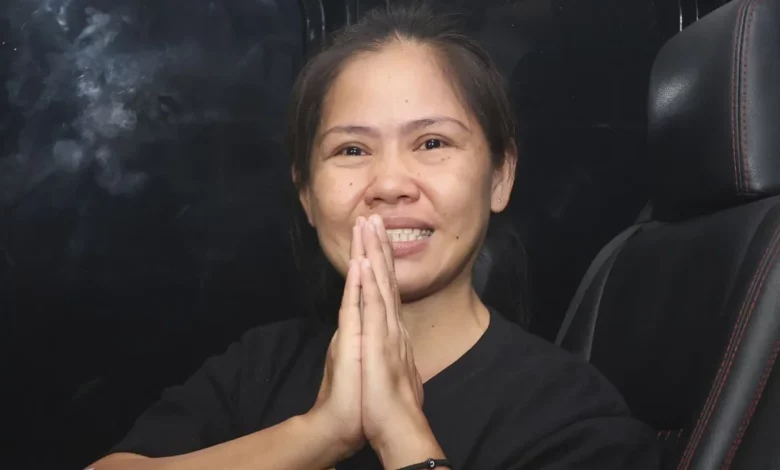
A Filipina woman, who had been on death row in Indonesia for almost 15 years, has finally returned home to await a possible pardon in a women’s prison. Mary Jane Veloso, 39 years old, arrived at the Manila airport early Wednesday after the repatriation agreement relieved her of the threat of execution since the Philippines had abolished the death penalty.
Veloso was sentenced to death in 2010 after authorities discovered 2.6 kilograms (5.7 pounds) of heroin hidden in a suitcase she was carrying. She boarded an overnight commercial flight without handcuffs, accompanied by Filipino correctional officials, after a Jakarta ceremony that marked the conclusion of a harrowing chapter in her life.
Upon arrival, Veloso was whisked away by heavy security to a women’s prison. Supporters outside the terminal chanting slogans such as “Clemency for Mary Jane” and “Free, free Mary Jane” did not get the chance to meet her. Later in the day, prison guards allowed her family to visit, and her two sons raced to her and clung tightly to her inside the prison compound.
I hope our president [Ferdinand Marcos] will grant me clemency so I can return to my family. I have been in jail in Indonesia for 15 years for something I did not commit,” Veloso said, her voice shaking with emotion after undergoing a medical examination at the Manila prison. Technically still serving a life sentence, she expressed her hopes for a brighter future.
Veloso’s case made many headlines in the Philippines, where her conviction and sentence on death raised people’s uproar. She had come to Indonesia thinking she was going to get employed as a domestic worker, a promise made by recruiter Maria Kristina Sergio, who, allegedly, gave her the suitcase containing drugs.
In 2015, Veloso was transferred to an island prison where she and several other drug convicts were scheduled for execution. While the others were executed, Veloso received a stay of execution after Sergio was arrested in the Philippines two days prior. Sergio faces human trafficking charges, and Veloso was named a key prosecution witness.
Her story has become emblematic of the struggles faced by many in the Philippines’ vast economic diaspora, particularly those seeking work abroad to escape poverty. President Marcos acknowledged Veloso’s plight last month, describing her as “a mother trapped by the grip of poverty” whose desperate choice changed the course of her life.
On Wednesday, Marcos thanked Indonesia for transferring custody of Veloso but stopped short of addressing the possibility of a pardon. Under the terms of her repatriation, the life sentence meted out to Veloso is now in the custody of the Philippines, which holds jurisdiction to grant clemency, remission, or amnesty.
Justice Undersecretary Raul Vasquez said Veloso’s plea for clemency would be “seriously studied,” although if she is not pardoned, she will continue to serve her life sentence. Indonesia’s government has said it would respect whatever decisions Manila makes over the fate of Veloso.
The agreement also carries a “reciprocity” provision, which states that in case Indonesia seeks similar assistance in the future, the Philippines will also give way. There has also been speculation that Indonesia could try to seek custody of Gregor Johann Haas, an Australian who faces possible execution for alleged drug crimes in the Philippines.
Of those, about 530 are currently on death row, mostly for drug offenses; 96 of them are foreigners. Indonesia executed some citizens and foreigners in July 2016, the last batch of executions to take place. Five Australians who served close to 20 years in Indonesian prisons for heroin trafficking arrived in Australia in late May after a government deal.



